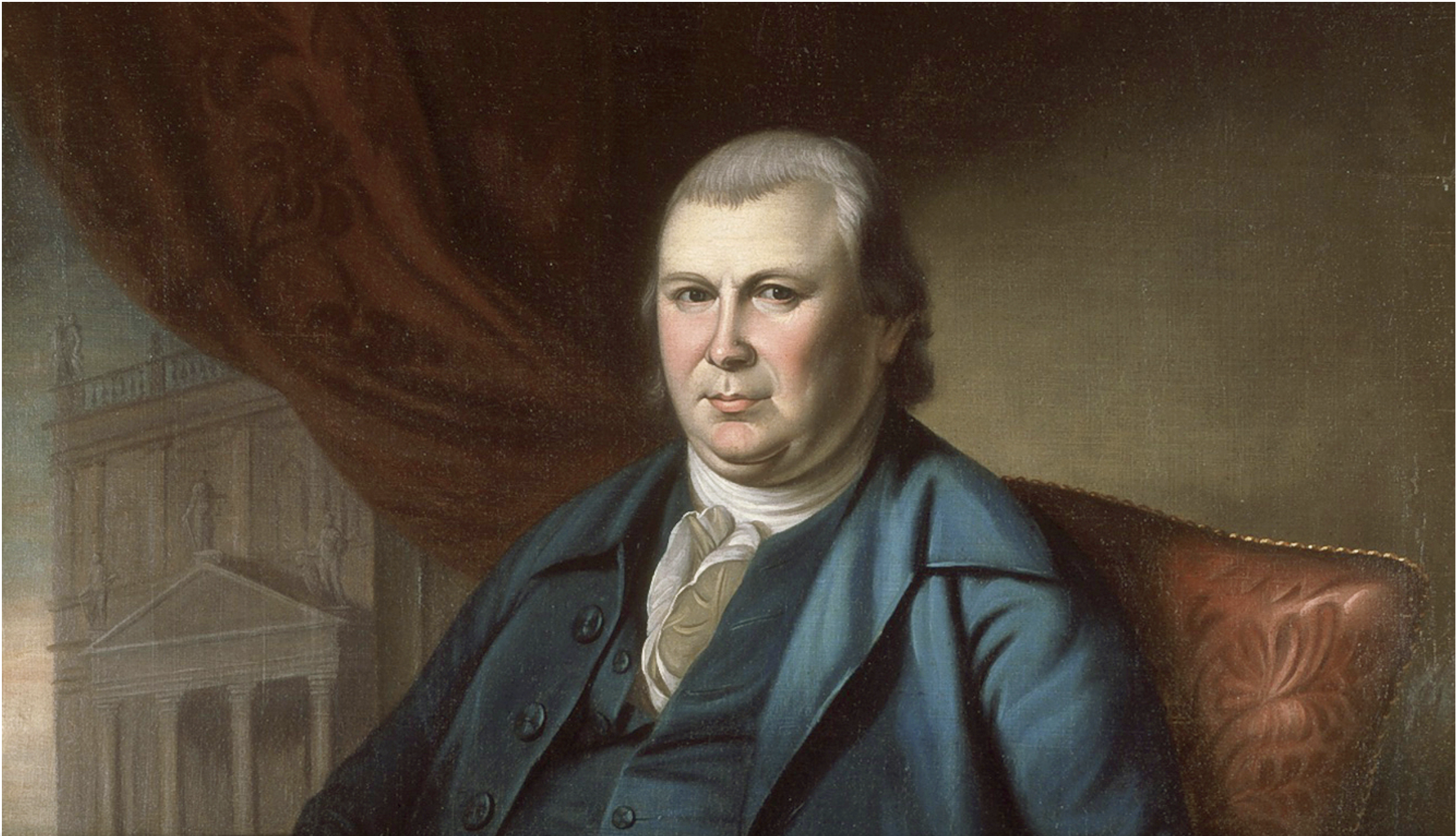
By Colin Zimmerman, Military Historian, Friends of Washington Crossing Park
All too often when we reflect on the Delaware River Crossing and surprise attack on Trenton, our minds naturally drift toward images of General George Washington and his tired, cold, and ragged Continental soldiers struggling with determination through bone-chilling wind, an ice-choked river, and a penetrating wetness produced by a nor-easter.
While certainly this imagery demands center stage of the drama that unfolded, there are other figures and events which played a critical role in precipitating and propelling the operation. One of these essential individuals was Mr. Robert Morris, known to many as the Financier of the Revolution. While better known in the Philadelphia region, his name is often not included on lists of important figures associated with the Crossing even though his involvement leading up to the Crossing proved absolutely essential.
Any focused study of great generals or military campaigns will always share the common denominator of logistics. Successful military operations simply cannot occur without it. George Washington’s strategic designs and the Continental Army’s capabilities to function completely depended on logistics.
Robert Morris, a Liverpool orphan turned successful Philadelphia businessman, had by the eve of the Crossing emerged as a Patriot leader and signer of the Declaration of Independence.¹ Instead of fleeing Philadelphia, Morris showed his commitment to the cause by opting to remain and work to assist the Continental Army so that it could remain operational in the field. As a member of Congress, Morris was appointed to the Secret Committee of Trade, which supervised the procurement of arms and ammunition necessary for the Continental Army to function. As a result, a professional relationship developed between Washington and Morris, one that would prove critical in December of 1776.
The Continental Army’s logistical situation while in Bucks County was destitute and resultant from a chaotic retreat through New Jersey that fall. In some ways, the destruction of supplies proved critical in escaping intact, however. Now, with the safety of the Delaware River between them and the Crown Forces, the need for new clothing, tents, and blankets had become a paramount factor in the army’s ability to survive, let alone function.² General Washington understood that if his army was to counter thrust into New Jersey, he would need a fresh supply of clothing and blankets to remain in the field. Washington therefore dedicated a significant portion of his efforts to finding these necessary items for his army. Unfortunately, the immediate community around Newtown was not able to meet the needs for the few thousand soldiers all in want of various items. Further compounding the problem was the inability to pay for supplies in hard cash and find methods to transport material in a region that had become panic stricken with the war moving toward its doorsteps.³
As luck would have it, Robert Morris, along with the other members of the Secret Committee of Trade and the Marine Committee, had in September dispatched the sloop Independence on a mission to Martinique to trade raw material for military supplies, including wool cloth and blankets. The ship was hindered by the pursuit of the Royal Navy, forcing the Independence to hold over in Virginia temporarily. Avoiding the Royal Navy blockade at the mouth of the Delaware River, the sloop arrived at the ports of Philadelphia on December 20th.⁴
Morris, aware of the army’s desperate need of supplies, wrote General Washington on the 21st, “There is onboard 856 Blankets which were intended with many others now expected in, for the use of the new enlistments, but the inclement weather and the severe duty the Troops now under your Command have to perform Induces me to think, these Blankets shou’d be applyed to their use in this matter however you will please to Judge & act as you see fit, for I shall send them to the Camp for your orders so soon as the Weather will permit them to be landed.”
Two days later, 463 more blankets and over 300 pairs of wool stockings also arrived, and this critical information was even more welcomed by Washington who wrote back, “for godsake hurry Mr Mease with the Cloathing as nothing will contribute more to facilitate the recruiting Service than warm & comfortable Cloathing to those who engage.” He then expressed his opinion of the value of Morris’s diligence with “I think with you Sir (that however missed you may be in Congress) your presence in the City cannot be dispensed with.”⁵ Robert Morris between December 23 and Christmas morning worked around the clock to ensure these items were offloaded and placed on wagons to reach the army at Newtown, which in and of itself proved to be a major undertaking. Through his efforts, Robert Morris afforded the Continental Army the necessary logistics in supplies that the soldiers needed to perform their duties during the Crossing and attack on Trenton. The United States owes a great debt to Mr. Morris’s efforts, for without him the Christmas Miracle of 1776 would likely not have been possible.

